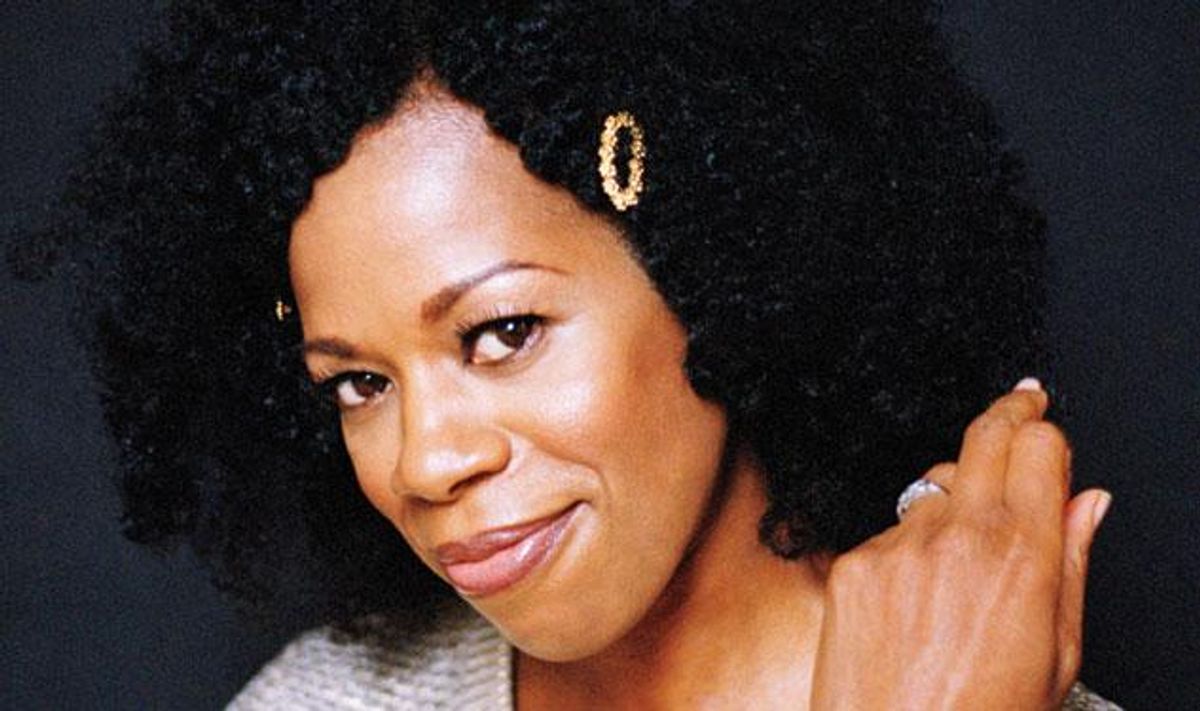Television
Kim Wayans

The actress keeps a straight face in 'Pariah,' her welcome and dramatic second act.
January 06 2012 5:07 PM EST
February 05 2015 9:27 PM EST
By continuing to use our site, you agree to our Private Policy and Terms of Use.

Photography by Peter Ash Lee
"I see you noticing my ring," says Kim Wayans of the silver trinket with three large white stones covering two knuckles of her index finger. "Only a long, tall gal can carry this off."
Wayans is sitting in a leather booth of the Peacock Alley restaurant in the Waldorf-Astoria hotel. She is six feet tall and looks about 20 years younger than her age, which is 50. Above her, in a gilded frame, is a painting of two albino peacocks.
"I wanted to be an actress since I was born," says Wayans, who stars in the recently released lesbian coming-of-age film Pariah. "I came out of the womb a desperado, wearing wigs, dancing and singing for anybody I could pin up against the wall to watch me for five minutes. But you have to make a living, so I got an English degree to fall back on."
Wayans casts a side-eye glance, contorts her mouth into a grimace, leans forward, and mutters, "That's a joke, falling back on an English degree." She throws her head back and lets out a deep laugh and claps. Her ring flies off her hand and hits the wall.
Wayans is a natural comedienne, most famous for being on In Living Color, Fox's 1990s black-centric sketch-comedy show that ushered in a decade of Wayans-dominated fare. But the Wayans clan started out in a Manhattan housing project before becoming the first family of comedy. Kim is currently shopping a sitcom, Growing Up Wayans, based on her childhood.
Her debut dramatic performance in Pariah is as Audrey, the constrained matriarch of a collapsing family. Her daughter, Alike, is in the process of coming out of the closet, something Audrey cannot accept. Wayans delivers a revelatory, knockout turn as a woman on the verge--a subtle emotive performance that builds into a violent squall. "I knew I had it in me to do drama," she says. "But in Hollywood, they put you in little boxes, and I've been labeled as a wacky comedian. I had such compassion for this sad, lonely woman." Wayans's manager called in a favor to get an audition with writer and director Dee Rees, who based the film on her own upbringing.
"Kim was the only actress who brought forth Audrey's vulnerability and genuine desire to connect," says Rees. "Kim came in and completely nailed it. She made us feel her hurt, and we knew that she was 'the one' right away." It's a good thing, too, as Rees was about to rewrite the part.
"Dee felt like she was getting the same black angry mama over and over again," Wayans says. "When I read it, I wasn't like, 'Wow, she's a monster.' This is a mother desperate to save her child from what she believes is a lifestyle that will lead to destruction. These beliefs are based on her own conditioning and religious doctrine. It doesn't mean I condone Audrey's actions, because they were just plain wrong."
In lieu of rehearsal, the cast met once in character with a counselor for a family therapy session. Shooting took 18 days, during which Wayans had to go to very dark places. "It was heavy," she admits. "But I'm not one of those actresses that carries it with me. I inhabit the world and character, and when she says, 'Cut,' Kim's back in the house cracking jokes and it's party time."
The powerful film has already garnered plenty of awards chatter--including some for Wayans. But the immediate rewards have been with filmgoers. "So many young gay people have come up and expressed how wonderful it is to bring dialogue to this subject that needs to be talked about," shes says.
Wayans finishes her tea and gets up to leave. She has back-to-back interviews today to promote Pariah. "I'm so proud," she says. "I've been talking about it for months, since Sundance, and I never get tired of it. A movie like this with the power to transform and enlighten? Hell, yeah I'm excited."
Want more breaking equality news & trending entertainment stories?
Check out our NEW 24/7 streaming service: the Advocate Channel!
Download the Advocate Channel App for your mobile phone and your favorite streaming device!